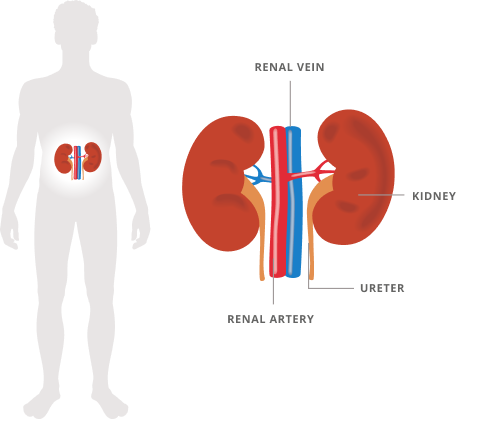
Kidneys – the silent heroes
- Home
- Kidneys – the silent heroes
On your back, above the pelvis, two of them, left and right. They clean your blood and eliminate waste substances via the urine. Some people may have wondered about the colour of their urine, but apart from that, most people don’t know much about their kidneys. This is probably because they do their job largely unnoticed. Yet, a close look at how they work is worthwhile: It can help us grab why they are worth protecting.
This is how kidneys work
Since their work is so essential, we are provided with doubles. Kidney beans, kidney tables or dishes – their shape is popular and prominent. Ten to 12 centimetres in size, these organs have one main task: Filtering five to six litres of blood, non-stop.

The unfiltered blood enters the kidney via the renal artery and then passes through a million tiny filter units. These are made of a renal corpuscle and a renal tubule. A first version of urine called primary urine emerges from the renal corpuscle, a tangle of tiny blood vessels. 180 litres of primary urine are produced every day, collected in the renal tubules, and filtered again. All the filtering concentrates the urine and changes its composition essentially. The renal corpuscles also remove substances from the blood that the body still needs, such as sugars, some salts and water, so the body takes them back up from primary urine to the blood. 99 percent of them are reclaimed. On average only two litres of secondary urine per day make it to the renal pelvis via the ureter and on to the bladder.
Some substances the kidneys filter include
-
waste substances like urea, uric acid, or creatinine,
-
salts like table salt,
-
drug residues.

Other functions
Kidneys don’t just produce urine; they also control our fluid balance and the blood pressure on top of it. They determine how much water is eliminated via the urine. The less water they excrete, the more in retained in the blood vessels, increasing the blood pressure. If they excrete more water, the blood pressure decreases. In addition, the kidneys create some messenger substances which contribute to controlling blood pressure. Kidney and heart health are mutually dependent on each other.
The amount of salt that the kidneys filter into the urine influences the acidity of the blood, its pH value. It is key for the pH value to be maintained in a steady state because it affects the blood’s ability to carry oxygen. Even the body’s energy metabolism depends on the kidneys: If the blood glucose levels run low, the kidneys can produce the required sugar.
Erythropoietin is another messenger substance that is produced in the kidneys. It is important for creating red blood cells. While filtering the blood, the kidneys check its oxygen content – if it is too low, they initiate production of red blood cells in the bone marrow via erythropoietin as messenger substance.
Besides all this, the kidneys are key for generating the active metabolite of vitamin D – the only vitamin the body can manufacture by itself. Vitamin D influences the sturdiness of the bones and the immune system and is well known as the sun vitamin because the body requires UVB light for its production.
In a nutshell, the kidneys help our bodies to remain fit and full of energy, to take good care of our bones and immune defence.
How do you keep your kidneys healthy?
To prevent or slow the progression of Chronic Kidney Disease, particular attention should be paid on the following risk factors:
- Unhealthy diets
- Excess weight
- Smoking
- Frequent and extended intake of certain pain killers
In addition, regular checks for increased blood pressure and blood sugar levels are recommended.

What is the ABCDE profile?
Now that we know how important it is to know how our kidneys are doing, everybody should be interested in their ABCDE profile:
A for albuminuria
B for blood pressure
C for cholesterol
D for diabetes
E for estimated glomerular filtration rate (eGFR– estimation of kidney filtering capacity)
The ABCDE profile may help to identify the risk of kidney diseases. You can read more about this here.

The importance of a check up
Almost as simple as washing hands - a little urine test could prevent dialysis and transplantation.
